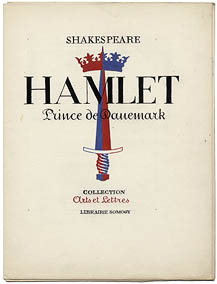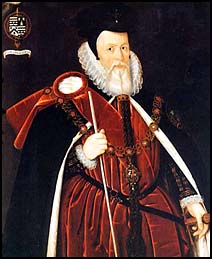Did you hear the one about the guy who became a really famous author because of plays and sonnets some other guy wrote? Me either, but there is some thought-provoking evidence that the author of all the works attributed to William Shakespeare was in fact Edward de Vere, the 17th Earl of Oxford. In Parts 1 and 2 of this series, I introduce the centuries-old debate and illustrate a few points of doubt regarding Shakespeare as the author.
 The trouble with the argument in a short form is that there are so many related, interconnected, “coincidental” points of contention that the tapestry of evidence quickly becomes complex and hard to navigate. That fact, however, serves the argument itself: there is a lot of circumstantial evidence indicating Oxford as the author. A lot. But this blog post series is a short form of writing and as a result, I will limit myself to a couple of points then focus on Hamlet, that work and its relation to my own being the reason this whole thing started in the first place. (You may recall I’m writing a YA novel that’s a contemporary retelling.)
The trouble with the argument in a short form is that there are so many related, interconnected, “coincidental” points of contention that the tapestry of evidence quickly becomes complex and hard to navigate. That fact, however, serves the argument itself: there is a lot of circumstantial evidence indicating Oxford as the author. A lot. But this blog post series is a short form of writing and as a result, I will limit myself to a couple of points then focus on Hamlet, that work and its relation to my own being the reason this whole thing started in the first place. (You may recall I’m writing a YA novel that’s a contemporary retelling.)
In Part 2 of this series, I touched upon the opinion that the author in question would most likely have an outstanding education. It is widely accepted that William Shakespeare did not, raised by illiterate parents and having left grammar school at age 13. But guess who did? Of course a superior education hardly proves authorship, but it does establish the essential foundation for a realistic authorship claim. And there are many details of his education that directly link to content in the plays and sonnets. One example: Oxford made 1,028 marginal notations in his bible. 250 of these can be directly linked to lines in Shakespeare’s plays. If that seems an unimpressive coincidence, ask yourself this: why is that bible now in the possession of the Folger Shakespeare Library in Washington D.C.?
The second broad-stroke point is that Edward de Vere was praised in aristocratic circles as a gifted writer, yet only a handful of short poems bear his name. Much is made of accounts written (or spoken) by scholars such as Gabriel Harvey, William Webbe and Henry Peacham. The latter published a discourse in 1622 titled The Compleat [sic] Gentleman, in which he names Oxford first in a list of the greatest Elizabethan poets. William Shakespeare is not mentioned on the list, despite its being published just 4 years after Shakespeare’s death. (Oxford had been dead 18 years by then.) Combine this and other scholarly omissions of Shakespeare with the fact that Shakespeare’s death was uneventful and unregarded compared to other well-known writers of his day, and the Debate-as-Hydra grows a new head: did people of his day actually think Shakespeare was a fraud?
(It turns out some did, but these whistleblowers, however, only left clues in their writings in a Sgt. Pepper/”Paul is Dead” kind of way. Fun, but far too much to get into here.)
 Now on to Hamlet, beginning with a little family history on Oxford: Edward’s father died unexpectedly in 1562, shortly after revising his will. The main beneficiary was then the Earl of Leicester Robert Dudley, whose first wife died under suspicious circumstances and who was suspected of poisoning several other people during his lifetime. Leicester was also a close companion and lover of Queen Elizabeth. Edward De Vere’s mother married a lieutenant of Leicester’s a little more than a year later. Sounds like a fictional stage drama, but who’d believe it?
Now on to Hamlet, beginning with a little family history on Oxford: Edward’s father died unexpectedly in 1562, shortly after revising his will. The main beneficiary was then the Earl of Leicester Robert Dudley, whose first wife died under suspicious circumstances and who was suspected of poisoning several other people during his lifetime. Leicester was also a close companion and lover of Queen Elizabeth. Edward De Vere’s mother married a lieutenant of Leicester’s a little more than a year later. Sounds like a fictional stage drama, but who’d believe it?
A second point of interest involves Oxford’s brother in law, who was sent to Elsinore Castle in Denmark in 1582 as an envoy to the Queen. During his five-month stay, he met several Danish court companions and advisors, one of which was named Rosenkranz and another Guildenstern. Could these names have traveled from the highest Danish court to the London commoner/theater crowd in a way that inspired Shakespeare? Not likely, but likelihood is not the point. If Shakespeare wrote Hamlet, he used those actual names in a painstakingly, impossibly meticulous exercise in authenticity which would serve no purpose, dramatic or otherwise. If Oxford wrote Hamlet, he simply lifted the names from his own life experience (in this case from an anecdote told to him by a family member.)
Perhaps the most interesting connection centers around the character of Polonius, whom many scholars believe was modeled after Queen Elizabeth’s leading counsellor, Lord Treasurer, and Principal Secretary William Cecil, Lord Burghley. Stop right there. If Shakespeare wrote Hamlet, he’d have based Polonius on a complete stranger who outranked him in society by light years. If Oxford wrote it, he based Polonius on the man who was in charge of his (de Vere’s) education throughout his childhood.
What do we mean by “based on”? There are several “inside jokes” that connect Oxford’s personal life with Polonius’ lines (none of which are flattering), but I’ll just focus on one example. In the pompous character’s most famous speech, he gives his son Laertes life advice as the young man prepares to leave for France. (This is the “neither a borrower nor a lender be … to thine own self be true” speech.) In the play, Polonius refers to his collective advice as “precepts.”
Ok, ready? In 1618 (years after Hamlet was first performed), a pamphlet was published. Written many years before by Burghley, the pamphlet was a collection of life advice that Burghley wrote for his own sons. Its title? . . . wait for it . . . Certain Precepts or Directions. Simply put, there is no way Shakespeare could have known about this personal piece of writing by one of the most powerful men in England. Conversely (and equally simple), there is no way Oxford could not have known about it.
Two more points on Polonius: Oxford was “matched” and “forced” to wed Burghley’s daughter. No, her name wasn’t Ophelia, but you get the point. And much is made over Burghley being sometimes called “Polus.” Stratfordians are quick to point out the lack of evidence for this nickname theory. What they seem to neglect, however, is that Burghley had an oft-spoken motto for himself: “Cor unam, via una.” (Latin for “One heart. One way.”) What does that have to do with anything? Well . . . Polonius’ original name in the play was “Corambis” (meaning “Two Hearts” or “Double-Hearted”) a not-so-subtle jab at the duplicitous, hypocritical Burghley.
Want more? Oxford’s cousins Horace (Horatio) and Francis (Francisco) were soldiers and confidants. And once while traveling, Oxford declined an offer to review German troops (a task Hamlet does perform for Fortinbras’ troops). On that trip Oxford was spied on by men sent by Polonius (er… uh … I mean Burghley). And oh yeah, on that same trip, his ship was attacked by pirates (just like Hamlet’s is in the play).
So yeah . . . Can tell I’ve been a bit consumed by this topic lately? I admit I do have an affinity for the alternative, unconventional point of view. Is there a conclusion here? While it’s obvious what I believe to be true, I look forward to continuing my reading on the topic. Apologies for not presenting the Stratfordian case in full. To be honest, I’m still wrapping my head around that. Scholarly works I’ve read offer “his name is on the title pages” and “everyone says he wrote them” as evidence for Shakespeare authorship. (I’m not kidding.) As promised, I’ve included my source books at the end here. I’d be very curious to know what you think of this debate.
As always, thanks for reading.
Mm
Main Source Material:





The best part of speculative history is its speculative nature. We are unlikely to ever learn the ‘truth’ so great fictions can be woven from the bits and pieces, the threads of evidence that can be pulled and used as as the basis for stories. I may have studied history in school, but I write history so I love this stuff. Carry on!
Thanks Candy. I couldn’t agree more that the “what ifs?” and the “who knows?” provide the best mining ground for stories. Looking forward to checking yours out – I’m a Frankenstein fan as well! Congrats!
Glad we’re on the same page. Sometimes history is clear, but more often it’s fodder for fiction.